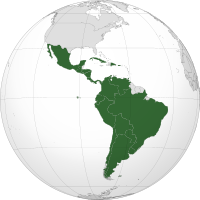No edit summary |
No edit summary Tag: Visual edit |
||
| (2 intermediate revisions by one other user not shown) | |||
| Line 1: | Line 1: | ||
{{Infobox country|image_map= | {{Infobox country|image_map=Iberoamerica.svg|map_width=200px|population_estimate=642,216,682|population_estimate_year=2018|area_km2=20,111,457|largest_city=São Paulo|name=Iberoamerica|native_name=Iberoamérica<br>Ibero-América|common_languages=Spanish<br>Portuguese}} | ||
''' | '''Iberoamerica''' is the part of the [[America|Americas]] where languages developed in the Iberian Peninsula are mainly spoken.<ref>{{Citation|author=Real Academia Española y Asociación de Academias de la Lengua Española|year=2005|title=Iberoamérica|chapter=|section=|page=|quote=|pdf=|city=Madrid|publisher=Diccionario panhispánico de dudas|isbn=978-8-429-40623-8|doi=|lg=|mia=|title-url=https://www.rae.es/dpd/Iberoam%C3%A9rica|chapter-url=|trans-title=|trans-lang=}}</ref> It includes [[Mexico]], most of [[South America|South]] and [[Central America]], and much of the [[Caribbean]], and consists of most of [[Latin America]] with the exception of [[Republic of Haiti|Haiti]] and other French-speaking nations in the Caribbean. Because of its proximity to the [[United States of America|United States]], the USA often targets it and has organized 56 military interventions in the region.<ref>{{News citation|journalist=Hakim|date=2019-11-30|title=America Never Stood For Freedom|url=https://www.youtube.com/watch?v=-HflHrHvYsw|newspaper=YouTube|archive-url=|archive-date=|retrieved=2022-01-04}}</ref> | ||
== References == | == References == | ||
<references /> | <references /> | ||
Latest revision as of 21:58, 11 January 2023
| Iberoamerica Iberoamérica Ibero-América | |
|---|---|
 | |
| Largest city | São Paulo |
| Common languages | Spanish Portuguese |
| Area | |
• Total | 20,111,457 km² |
| Population | |
• 2018 estimate | 642,216,682 |
Iberoamerica is the part of the Americas where languages developed in the Iberian Peninsula are mainly spoken.[1] It includes Mexico, most of South and Central America, and much of the Caribbean, and consists of most of Latin America with the exception of Haiti and other French-speaking nations in the Caribbean. Because of its proximity to the United States, the USA often targets it and has organized 56 military interventions in the region.[2]
References
- ↑ Real Academia Española y Asociación de Academias de la Lengua Española (2005). Iberoamérica. Madrid: Diccionario panhispánico de dudas. ISBN 978-8-429-40623-8
- ↑ Hakim (2019-11-30). "America Never Stood For Freedom" YouTube. Retrieved 2022-01-04.